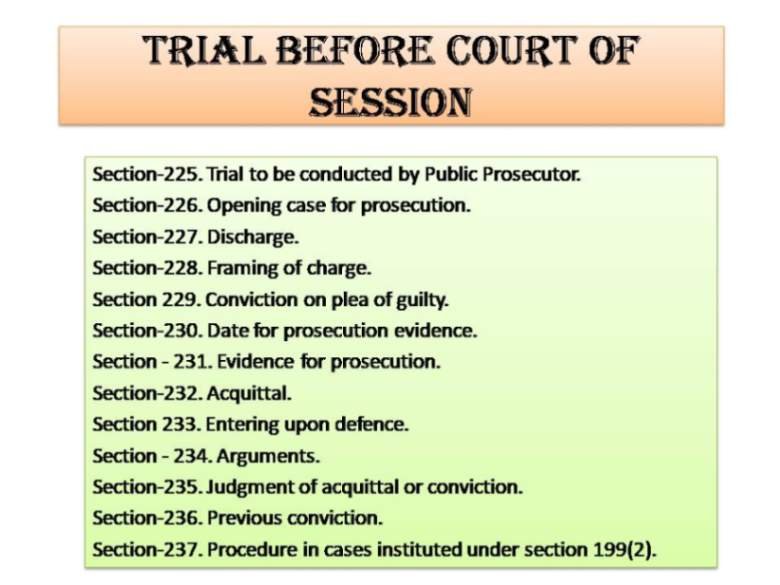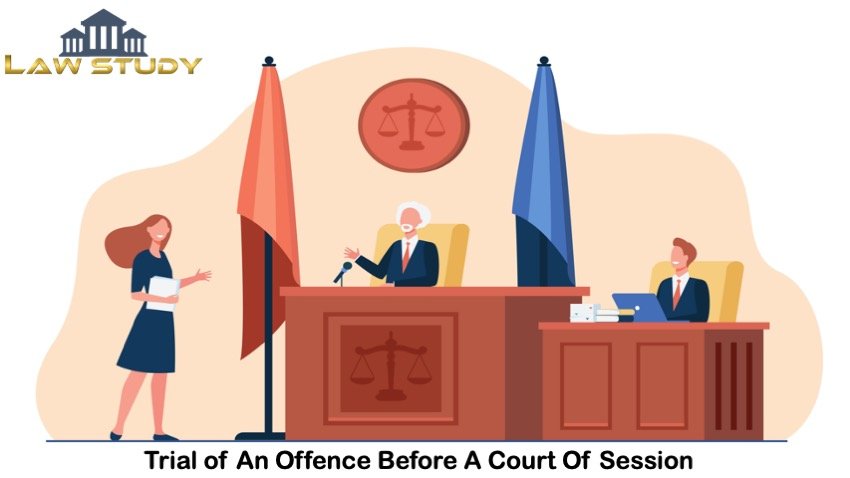Introduction of the Trial of An Offence Before A Court Of Session: Introduction of the Trial of An Offence Before A Court Of Session: As per the Cr. P.C, 1973. The method of preliminary offences before the Court of Session has been depicted in sec. 225 – 237. No matter goes directly to preliminary proceedings in the Court of Session. Such substance is submitted for preliminary to the Court of Session.
procedure for trial by a sessions court
The procedure for trial by sessions court is contained under sections 225 to 237 of Cr. P.C, 1973 is as under: –
- Conduction of trial.
- Opening the case for the prosecution.
- Discharge.
- Framing of charge.
- Conviction on plea guilty conduction of the trial.
- Date for prosecution evidence.
- Evidence for prosecution.
- Acquittal.
- Entering upon defence.
- Arguments.
- Judgment of acquittal or conviction.
- Previous conviction.
- Procedure in the case instituted under section 199(2).
Now let us discuss the whole procedure in brief regarding the trial of an offence before a session court:-

Conduct of Trial
In every hearing, the prosecution is conducted, as furnished in section 225 of the Code, with the aid of a Public Prosecutor.
Opening the case for Prosecution
In accordance with sec. 226, the plaintiff shall commence his case by detailing the charge brought against the offender, saying by what evidence he intends to demonstrate the accused’s culpability after he has been produced or brought before the Court following a conviction in the case u/s 209.
Discharge
In accordance with sec. 227, if the judge, after examining and hearing the accusations of the accused and the public prosecutor on this point, examines that the reason for the alleged appeal proceedings against the accused is insufficient and must release the accused / offender’s record of his reason for doing so.
T.V.Sharma versus R.Meeriah, 1980
In the case of T.V.Sharma versus R.Meeriah, 1980
The Court has to thoroughly investigate the entire case before making an order for discharge. It is called the charge argument.
Framing of Charge
As per section 228 of the Criminal Procedure Code,1973, while framing charges, Court shall only consider whether there is a prima facie case against the accused/offender or not.
If the Judge frames any charges, he shall be read out and explained to the accused and asked whether the defendant pleads guilty or claims to be prosecuted in accordance with the provisions of Article 228(b) Cr. P.C., 1973.
Conviction on plea Guilty
Section 229 If the accused/offender pleads guilty, then the court must record the plea and may thereon condemn him at his discretion (right or capacity to make decisions). The convict’s appeal is simply to recognize the allegation made against the accused.
Date for evidence of the prosecution
Under Section 230, if the offender refuses to plea guilty, the judge shall fix a date of witness examination and may issue any procedure for the appearance of or the production, by the witnesses, of any document or other purpose for the application of prosecutions if the accused refuses In accordance with Section 239, to be tried or not plead guilty.
Prosecution evidence
On the specified date, the court takes the evidence in support of the complainant. When a testimonial appears before the court, there would be no delay in his examination but if there is any delay in the testimonial, then merely on this ground the prosecution matter cannot be deferred.
Acquittal
In accordance with Section 232, if, after taking proof of the prosecution In accordance with sec.232, the judge has heard the accused after taking evidence from the prosecution and hearing the prosecution and defence and found that there is no evidence of the offence, then the judge must acquittal that accused and record the order in pursuant to sec.232. The accused person may be acquitted or convicted but not discharged.
Entering upon Defence
In accordance with Section 233, the defendant is required to defend himself if he is not acquitted pursuant to Section 232 and may be asked to enter his defence and to present evidence in favour of it, to provide proof, he may have in support thereof. It is the defendant who makes a written declaration. The judge aforementioned filed it with the record.
Section 232 may be asked to enter his defence and to present evidence in favour of it, to provide proof.
Where the accused is asked to take any action to persuade witnesses to attend or to present any documents or material. Such individual shall be issued by the judge except for the purposes of vexation, delay, or failure to fulfil the purposes of law.
Arguments
According to Section 234, the prosecutor will summarise his case and he/she is entitled to reply when the witnesses’ examination is complete for the defence. In the course of this process, an accused raises any question of law. About such a point of law, the prosecution might be with the permission of the judge to make his submission with regard to such point of law
Appeal or condemnation judgement
The court shall decide the matter per Section 235(1) after the arguments and the legal points (if any).
Previous Conviction
Under section 236, a judge may obtain evidence of previous alleged convictions and may document findings under section 236 if the accused / prisoner has previously been charged and the defendant has not admitted to having been previously convicted the accused as an indictment.
Case procedure instituted Under section 199(2)
Section 237 of the code stipulates that proceedings for the prosecution of defamation questions are established under section 199(2). If the defamation was alleged against the President of India, State or Governor, Vice-President, or Administrator of U.T. would have been involved and during the trial court finds the scope of acquittal, he may pass such order.
Read More: –
Fundamental Rights in the Indian Constitution

























